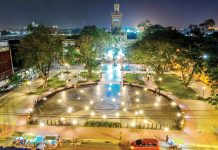
DURING the inauguration of Iloilo City as a chartered city on Aug. 25, 1937 or 85 years ago, social justice was the meat of President Manuel L. Quezon’s speech.
Prompted by the difficult plight of workers in sugar haciendas in Iloilo and Negros Island, he called for an increase in the wages of laborers.
The sugar industry, which boomed in Iloilo and neighboring Negros Island in the later part of the 19th century, was then suffering due to the declining demand for sugar. There were labor unrests and these scared investors away.
“I am merely stating a fact, for I want to point out that we are doing everything we can, not only to prevent the collapse, but to maintain in full blast, the prosperity of the sugar industry,” said Quezon.
Iloilo was deemed fortunate to be visited by Quezon that year. The city of Cebu, which was also inaugurated in 1937, was not graced by the presence of the country’s first elected president. Quezon instead sent to Cebu his Secretary of the Interior, Elpidio Quirino.
Speaking “on behalf of the working class,” Quezon told Ilonggos, “We must all cooperate to find the means and to use these to improve the lot of the working classes in the Philippines. Particularly, should the provinces enjoying the benefits of the sugar industry immediately and substantially raise the wages of labor.”
While sugar hacienderos were enjoying their wealth, Quezon noted that their sacadas were wallowing in poverty.
“No industry in the Philippines is being benefited by our trade relations with America nearly so much as the sugar industry. There have sprung in Negros, Iloilo and Pampanga, in the last few years, millionaires as we have never had before. They have palaces, automobiles, and live a life in comfort and luxury here and abroad,” observed Quezon.
The country’s first Commonwealth President clarified he was not criticizing the sugar barons.
“It is their privilege to spend their money as they please,” said Quezon.
But he asserted that “this prosperity be shared with the workingmen in the sugar fields and in the sugar centrals. Very little, if any, of the immense profits of the sugar industry has gone to the pockets of the labor.”
Quezon then warned the owners of sugar centrals and proprietors of sugar lands.
“I say in all earnestness…unless they raise the wages of their laborers and treat them better, the Government and the country may lose interest in the defense of the sugar industry,” said Quezon.
According to the President, he may be forced to ask the National Assembly to enact legislation that will compel the industry to do so “unless the sugar industry, of its own accord, increases immediately the wages of its workingmen.”
The National Assembly was the legislature of the Commonwealth of the Philippines from 1935 to 1941.
As President, Quezon said he was sworn to do justice to all Filipinos. He reminded public officials, “We cannot be the servants of a privileged class. We are the servants of the whole people and we shall not permit an injustice to be done, much less perpetuated, against any constituent part of our community.”
Raising the wages of laborers was a matter of justice, stressed Quezon.
“We are living in an age in which civilized society can only endure if justice is accorded equally to the rich and to the poor….This is a question of justice, not of charity. A man is more entitled to the fruits of his labor than the proprietor to the rent of his property,” said the President./PN







